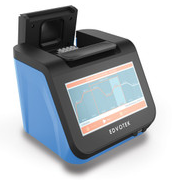 1.3. PCR TECHNIQUES
1.3. PCR TECHNIQUES

![]() We present a series of kits for carrying out various practical applications of the PCR technique, each kit consists of a theoretical part that the teacher work with students and a practical part consisting in PCR and results.
We present a series of kits for carrying out various practical applications of the PCR technique, each kit consists of a theoretical part that the teacher work with students and a practical part consisting in PCR and results.
The kits include reagents for conducting electrophoresis and staining (DANABLUE-FlashBlue or GELSAFE, if it is available a transilluminator).
You must have a thermal cycler to carry out these practices.
We can supply the EDVOTEK’s thermal cycler, firm that we represent.
STUDY OF VNTR HUMAN POLYMORPHISMS BY PCR
The DNA sequences that vary between individuals are known as polymorphisms. Students will prepare their own DNA from their mouth cells to be used for PCR and study the DS180 locus VNTR polymorphism.
> Kit includes:
MIX PCR, positive control, agarose, TAE and DANABLUE-FlashBlue or GELSAFE (if it is available a transilluminator).
> You need:
Micropipettes, PCR, microtubes, and thermal cycler.
DETERMINING Rh FACTOR BY PCR
Students will prepare their own DNA from their buccal cells to be used for PCR. In a second session, the amplified DNA is analyzed by electrophoresis and it is determinated the Rh factor.
> Kit includes:
MIX PCR, positive control, agarose, TAE and DANABLUE-FlashBlue or GELSAFE (if it is available a transilluminator).
> You need:
Micropipettes, PCR, microtubes, and thermal cycler.
STUDY OF ALU HUMAN POLYMORPHISMS BY PCR
The DNA sequences that vary between individuals are known as polymorphisms.. Students will prepare their own DNA from their buccal cells to be used for PCR and study the presence or absence of Alu locus in gene activator of plasmimogen.
> Kit includes:
MIX PCR, positive control, agarose, TAE and DANABLUE-FlashBlue or GELSAFE (if it is available a transilluminator).
> You need:
Micropipettes, PCR, microtubes, and thermal cycler.
PCR FROM GEN 16S rRNA OF BACTERIAL
This kit includes all material you need for the amplification of a fragment of the gene 16S rRNA of bacterial using the PCR technique. It is not necessary to isolate bacterial DNA, the kit is provided with a sample of bacterial DNA to perform the amplifications.
> Kit includes:
MIX PCR, positive control, agarose, TAE and DANABLUE-FlashBlue or GELSAFE (if it is available a transilluminator).
> You need:
Micropipettes, PCR, microtubes, and thermal cycler.
PCR FROM GEN 18S rRNA OF HUMAN
This kit includes all material you need for the amplification of a fragment of the gene 18S rRNA of human using the PCR technique. It is not necessary the students isolate their DNA, the kit is provided with a sample of human DNA to perform the amplifications.
> Kit includes:
MIX PCR, positive control, agarose, TAE and DANABLUE-FlashBlue or GELSAFE (if it is available a transilluminator).
> You need:
Micropipettes, PCR, microtubes, and thermal cycler.
GENETICALLY MODIFIED CORN DETECTION
This kit includes all material you need for the detection of transgenic Bt corn using the PCR technique. The kit is provided with several samples of corn powder and the material to the extraction of DNA from these samples and other possible chosen by the students.
> Kit includes:
Corn powder sample, MIX PCR, normal DNA positive control, transgenic DNA positive control, agarose, TAE and DANABLUE-FlashBlue or GELSAFE (if it is available a transilluminator).
> You need:
Micropipettes, PCR, microtubes, and thermal cycler.
EXPLORING THE GENETICS OF TASTE: SNP ANALYSIS OF THE PTC GEN BY PCR
DNA sequences that vary between individuals are known as polymorphisms. Students will prepare their own DNA fron bucal cells that will be used to amplify the TAS2R38 gene, wich is responsible for the ability to detect bitter taste. Subsequently, the purification of the PCR product will be carried out and it will be digested with the restriction enzyme HaeIII to identify the presence or absence of the SNP linked to the phenotype of detecting the bitter taste in PTC papers.
> Kit includes:
MIX PCR, positive control, agarose, TAE, GELSAFE, Kit purification PCR fragment, restriction enzyme HaeIII and control papers.
> You need:
Micropipettes, PCR, microtubes, thermal cycler, microcentrifuge and water bath for incubation at 37ºC.
INTRODUCTION TO REAL TIME PCR
This kit is an introduction to the Real Time PCR. Students will be able to prepare standard curves and quantify samples problema. The accumulating amplified product can be detected at each cycle with fluorescent dyes.
The presentation are individuals ready-to-use microtubes containing all the components needed to perform the quantification PCR assay.
> Kit includes:
MIX Individual microtubes containing dehydrated mixture of specific primers and labelled probe; DNase/RNase free wáter; Standard Template; Standard Buffer.
> You need:
Micropipettes, PCR microtubes and Real Time Machine.
DETECTION OF STREPTOCOCCO SALIVARIUS AND S. ORALIS IN SALIVA BY PCR
Students prepare their own DNA from buccal cells that will be used to perform PCR to detect bacteria present in the oral cavity.
Students will acquire basic knoledge about the biology and microbiology of bacteria in the oral cavity.
> Kit includes:
MIX PCR, positive control, agarose, electrophoresis buffer and GELSAFE DNA stain.
> You need:
Micropipettes, PCR microtubes, electrophoresis apparatus and thermal cycler.
DETECTION OF COVID-19 BY RT-qPCR
The objective of this experiments is to introduce students to a theoretical level in some variants of PCR, such as amplifying RNA fragments (RT-PCR) and quantifying the concentration of a specific nucleic acid molecule present in a sample (quantitative PCR or Real-time PCR).
Students will acquire basic knowledge of molecular biology and perform a standard PCR simulation for the detection of COVID-19.
> Kit includes:
MIX PCR, patients samples, negative control, positive control, agarose, electrophoresis buffer and GELSAFE DNA stain.
> You need:
Micropipettes, PCR microtubes, electrophoresis apparatus and thermal cycler.
